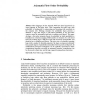Free Online Productivity Tools
i2Speak
i2Symbol
i2OCR
iTex2Img
iWeb2Print
iWeb2Shot
i2Type
iPdf2Split
iPdf2Merge
i2Bopomofo
i2Arabic
i2Style
i2Image
i2PDF
iLatex2Rtf
Sci2ools
126
click to vote
SEMWEB
2009
Springer
2009
Springer
Axiomatic First-Order Probability
Most languages for the Semantic Web have their logical basis in some fragment of first-order logic. Thus, integrating first-order logic with probability is fundamental for representing and reasoning with uncertainty in the semantic web. Defining semantics for probability logics presents a dilemma: a logic that assigns a real-valued probability to any first-order sentence cannot be axiomatized and lacks a complete proof theory. This paper develops a first-order axiomatic theory of probability in which probability is formalized as a function mapping Gödel numbers to elements of a real closed field. The resulting logic is fully first-order and recursively axiomatizable, and therefore has a complete proof theory. This gives rise to a plausible reasoning logic with a number of desirable properties: the logic can represent arbitrarily fine-grained degrees of plausibility intermediate between proof and disproof; all mathematical and logical assumptions can be explicitly represented as finite...
Related Content
| Added | 27 May 2010 |
| Updated | 27 May 2010 |
| Type | Conference |
| Year | 2009 |
| Where | SEMWEB |
| Authors | Kathryn B. Laskey |
Comments (0)

